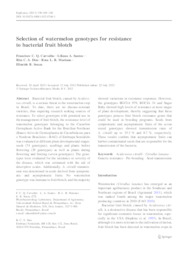Selection of watermelon genotypes for resistance to bacterial fruit blotch.
Selection of watermelon genotypes for resistance to bacterial fruit blotch.
Autoria: CARVALHO, F. C. Q.; SANTOS, L. A.; DIAS, R. de C. S.; MARIANO, R. L. R.; SOUZA, E. B.
Resumo: Bacterial fruit blotch, caused by Acidovorax citrulli, is a serious threat to the watermelon crop in Brazil. To date, there are no disease-resistant varieties, thus requiring research seeking sources of resistance. To select genotypes with potential use in the management of fruit blotch, the resistance level of watermelon genotypes belonging to the Cucurbits Germplasm Active Bank for the Brazilian Northeast (Banco Ativo de Germoplasma de Cucurbita·ceas para o Nordeste Brasileiro—BAG) of Embrapa Semia·rido was evaluated at different plant developmental stages: seeds (74 genotypes), seedlings and plants before flowering (29 genotypes) as well as plants during flowering and fruiting (seven genotypes). The genotypes were evaluated for the incidence or severity of the disease, which was estimated with the aid of descriptive scales. Additionally, A. citrulli transmission was determined in seeds derived from symptomatic and asymptomatic fruits. No watermelon genotype was immune to fruit blotch, and the majority showed variations in resistance responses. However, the genotypes BGCIA 979, BGCIA 34 and Sugar Baby showed high levels of resistance at most stages of plant development, thereby suggesting that these genotypes possess fruit blotch resistance genes that could be used in breeding programs. Seeds from symptomatic and asymptomatic fruits of the seven tested genotypes showed transmission rates of A. citrulli up to 35.3 % and 8.7 %, respectively. These results confirm that asymptomatic fruits can harbor contaminated seeds that are responsible for the transmission of the bacteria.
Ano de publicação: 2012
Tipo de publicação: Artigo de periódico
Unidade: Embrapa Semiárido
Observações
1 - Por padrão são exibidas publicações dos últimos 20 anos. Para encontrar publicações mais antigas, configure o filtro ano de publicação, colocando o ano a partir do qual você deseja encontrar publicações. O filtro está na coluna da esquerda na busca acima.
2 - Para ler algumas publicações da Embrapa (apenas as que estão em formato ePub), é necessário ter, no celular ou computador, um desses softwares gratuitos. Sistemas Android: Google Play Livros; IOS: iBooks; Windows e Linux: software Calibre.
Acesse outras publicações
Acesse a Base de Dados da Pesquisa Agropecuária (BDPA) para consultar o acervo completo das bibliotecas da Embrapa.

